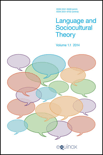
Language and Sociocultural Theory
Scope & Guideline
Decoding the Nuances of Human Communication
Introduction
Aims and Scopes
- Sociocultural Perspectives on Language Learning:
The journal emphasizes research that applies sociocultural theory to understand language acquisition processes, highlighting the role of social interaction, cultural context, and historical factors. - Dynamic Assessment and Mediation:
A core area of focus is the application of dynamic assessment methods, which integrate teaching and assessment in a way that supports learner development, particularly within second language contexts. - Integration of Multimodal Communication:
Research in this journal often examines the use of multimodal communication strategies in language education, investigating how various communicative resources can enhance learning. - Teacher Development and Identity:
The journal explores the professional development of language teachers, particularly how sociocultural factors shape teacher identity and instructional practices. - Application of Concept-Based Language Instruction:
There is a significant focus on innovative instructional approaches, particularly concept-based language instruction (C-BLI), which seeks to enhance language learning through conceptual understanding. - Cultural and Contextual Factors in Language Education:
Research often considers how cultural and contextual elements impact language learning experiences, particularly in diverse educational settings.
Trending and Emerging
- Technological Integration in Language Learning:
The development of programs and assessments that utilize technology, such as computerized dynamic assessment tools, is becoming a prominent theme, reflecting the growing importance of digital literacy in language education. - Focus on Learner Agency:
There is an increasing emphasis on understanding and promoting learner agency within sociocultural frameworks, particularly in relation to how students engage with language learning through their own perspectives and experiences. - Collaborative and Interactive Learning Environments:
Research highlighting the importance of collaborative learning and peer interactions is on the rise, showcasing the value of social dynamics in effective language instruction. - Cultural Historical Activity Theory (CHAT):
An emerging trend is the application of CHAT in language education, which provides a framework for understanding the complex interactions between learners, educators, and the sociocultural context. - Translinguistic Approaches:
There is a growing interest in translinguistic methods that leverage multiple languages in instruction, reflecting the increasingly multicultural and multilingual nature of classrooms.
Declining or Waning
- Traditional Language Teaching Methods:
There seems to be a waning interest in traditional, teacher-centered language teaching methodologies, as the focus shifts towards more interactive and socioculturally informed approaches. - General Linguistic Theory without Sociocultural Context:
Research that purely addresses linguistic theory without integrating sociocultural perspectives is becoming less frequent, as the journal prioritizes contextually situated language learning. - Static Assessments:
Static forms of assessment that do not consider the dynamic and interactive nature of learning are appearing less often, as the emphasis is increasingly on formative and ongoing assessment strategies.
Similar Journals

Studii de Lingvistica
Advancing the frontiers of language research.Studii de Lingvistica is a premier open-access journal committed to advancing the field of linguistics and language studies since its inception in 2011. Published by EDITURA UNIV ORADEA in Romania, this scholarly platform aims to disseminate high-quality research that encompasses various aspects of linguistics, encouraging contributions from researchers and professionals worldwide. With an impact factor that reflects its relevance, the journal holds a prestigious position in the Q2 category of Linguistics and Language for 2023. Despite its relatively nascent H-index, Studii de Lingvistica has carved a niche for itself, ranking 1017th and 1094th in Scopus across Arts and Humanities and Social Sciences, respectively. Researchers, scholars, and students alike will find valuable insights and pioneering studies within its pages, making it a vital resource for those engaged in the nuanced exploration of language and its cognitive dimensions. Located at UNIVERSITATII ST NO 1, PAVILION C, ORADEA, BIHOR, ROMANIA, this journal continues to foster academic dialogue and innovation within the linguistics community.
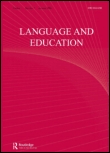
Language and Education
Fostering Excellence in Language Studies and TeachingLanguage and Education is a leading academic journal published by Routledge Journals, Taylor & Francis Ltd, specializing in the intersection of language studies and educational practices. With an impressive Q1 ranking in both Education and Linguistics and Language categories for 2023, it stands out as a crucial resource for researchers, educators, and industry professionals. Covering a wide array of topics pertinent to language acquisition, pedagogical methodologies, and culturally responsive education, this journal supports rigorous scholarship in the field. While not currently offering open access options, its contributions are vital for advancing knowledge and fostering innovation across disciplines. The journal's long-term commitment to excellence is evidenced by its high rankings in Scopus, placing it in the 94th percentile in Language and Linguistics and the 80th percentile in Education. Since its inception in 1987, Language and Education has not only tracked the evolving landscape of language education but has also actively shaped it, making it an indispensable tool for anyone invested in educational research and practice.

English Teaching and Learning
Empowering Educators with Research-Driven PracticesEnglish Teaching and Learning is a distinguished academic journal published by SPRINGER SINGAPORE PTE LTD, focusing on the dynamic fields of education and linguistics. With an ISSN of 1023-7267 and an E-ISSN of 2522-8560, this journal serves as a vital platform for researchers, educators, and practitioners interested in advancing the understanding of English language instruction and learning methodologies. Recognized for its high standards, it has achieved a notable Q2 ranking in Education and a prestigious Q1 ranking in Linguistics and Language in 2023, underscoring its impact within these essential scholarly fields. The journal, which spans a converged publication period from 2015 to 2024, endeavors to disseminate innovative research, theoretical insights, and practical applications, making it an invaluable resource for anyone committed to enhancing English education globally. Although it does not operate under an open-access model, its contributions are pivotal in shaping contemporary discourse in English teaching and learning.

TESOL Journal
Empowering Educators Through Innovative ResearchTESOL Journal, published by Wiley, is a premier academic journal dedicated to advancing the field of Teaching English to Speakers of Other Languages (TESOL). With an esteemed reputation reflected in its high impact factor and its Q1 ranking in both Education and Linguistics and Language categories for 2023, this journal serves as a critical resource for researchers, educators, and policy-makers. It covers a wide spectrum of topics related to language acquisition, pedagogical innovations, and educational strategies in TESOL, contributing significantly to the discourse around multilingualism and effective teaching practices. The journal is notable not only for its rigorous peer-review process but also for its commitment to disseminating high-quality research that informs and inspires practice in diverse educational settings. Interested readers can access articles through traditional subscription methods, ensuring that groundbreaking research is available to a broad audience. With converged years spanning from 2010 to 2024, TESOL Journal continues to evolve, making it a vital publication for anyone interested in the complexities of language education.

International Review of Pragmatics
Pioneering High-Quality Research in Communication StudiesInternational Review of Pragmatics is a leading scholarly journal published by BRILL, renowned for its contribution to the fields of Communication, Linguistics and Language, and Psychology. With an ISSN of 1877-3095 and an E-ISSN of 1877-3109, this journal offers a rigorous platform for high-quality research and theoretical contributions that explore the complexities of pragmatics across various domains. Situated in the Netherlands, the journal is currently ranked in the Q2 quartile for both Communication and Linguistics, reflecting its substantial influence and academic excellence. The Scopus rankings further emphasize its importance, with percentile rankings in the 55th to 78th range across several relevant categories. Since its inception in 2014, the journal has consistently pursued the objective of fostering interdisciplinary dialogue and advancing scholarly discourse in pragmatics. Although the journal does not currently offer open access options, it remains committed to accessibility in academia through various channels. Researchers, professionals, and students alike will find valuable insights and contemporary discussions that propel the field forward, making International Review of Pragmatics an essential resource for those dedicated to understanding the intricacies of human communication.
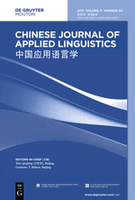
Chinese Journal of Applied Linguistics
Unveiling the practical applications of linguistic theory.The Chinese Journal of Applied Linguistics, published by the esteemed FOREIGN LANGUAGE TEACHING & RESEARCH PRESS, serves as a premier platform for scholars and practitioners in the field of linguistics, specifically focusing on the application of linguistic research in real-world contexts. With an ISSN of 2192-9505 and an E-ISSN of 2192-9513, this journal is distinguished by its position in the Q1 category for Linguistics and Language as of 2023, underscoring its influence and prestige within the academic community. Notably, it ranks 248th out of 1,088 in the Arts and Humanities field and 292nd out of 1,167 in Social Sciences, reflecting a strong percentile rank of 77th and 74th respectively. This journal aims to contribute to the advancement of applied linguistics through innovative research articles, comprehensive reviews, and critical discussions on contemporary issues in language learning and teaching, thereby attracting a diverse readership of researchers, educators, and students who are keen on exploring new linguistic paradigms. With its scope spanning from 2017 to 2024, the Chinese Journal of Applied Linguistics is committed to disseminating cutting-edge insights and fostering dialogues that propel the discipline forward, making it an essential resource for anyone engaged in the study of language and its applications.
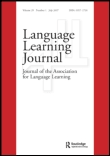
Language Learning Journal
Advancing the discourse in language acquisition.Welcome to the Language Learning Journal, a premier resource for researchers, educators, and linguists alike, published by Routledge Journals, Taylor & Francis Ltd. With a proud history dating back to 1990 and commitment to advancing the exploration of language acquisition, this esteemed journal boasts an impressive impact factor within Q1 rankings across both the Education and Linguistics and Language categories. Ranked #40 in Language and Linguistics and achieving a 96th percentile in the Arts and Humanities, the journal serves as a crucial platform for disseminating cutting-edge research, innovative methodologies, and impactful discussions in the field of language learning. Although currently not offered as an open access publication, the depth and quality of content ensure significant contributions to the body of knowledge for professionals and scholars. With its global reach, the Language Learning Journal is dedicated to fostering the development and understanding of language learning processes, enabling readers to stay informed about the latest trends and findings through rigorous peer-reviewed articles.

ELIA-Estudios de Linguistica Inglesa Aplicada
Advancing English Linguistics: Bridging Theory and ApplicationELIA-Estudios de Linguistica Inglesa Aplicada, published by the University of Sevilla, Faculty of Philology, is an esteemed open-access journal that has been a cornerstone in the field of English Linguistics since its establishment in 2000. With an ISSN of 1576-5059 and an E-ISSN of 2253-8283, ELIA aims to foster scholarly research and discourse by providing a platform for innovative studies in linguistics and applied language studies. As a testament to its academic rigor, the journal has achieved a Q2 ranking in Linguistics and Language for 2023, reflecting its impact and relevance within the academic community. The journal is indexed in Scopus, further solidifying its standing with ranks in both the Arts and Humanities and Social Sciences categories. Researchers, professionals, and students alike will find valuable insights and research findings that contribute to the evolving understanding of English linguistics. The journal is based in Sevilla, Spain, and can be accessed freely online, making it an accessible resource for those engaged in the study of language and linguistics.
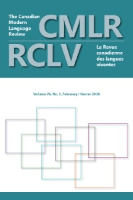
CANADIAN MODERN LANGUAGE REVIEW-REVUE CANADIENNE DES LANGUES VIVANTES
Cultivating a Community of Language Scholars and EducatorsCanadian Modern Language Review - Revue Canadienne des Langues Vivantes is a leading scholarly journal published by University of Toronto Press Inc, focused on the field of linguistics and language education. With its ISBN 0008-4506 and E-ISBN 1710-1131, this journal has established itself as a significant contributor to research in both the education and linguistics categories, currently holding a Q3 classification in Education and a Q2 in Linguistics and Language as of 2023. It boasts an impressive Scopus rank within the top percentiles for both fields, ensuring its validity and relevance among contemporary academic discourse. The journal's emphasis on publishing high-quality research aims to advance understanding and promote effective pedagogical practices, making it an essential resource for researchers, educators, and students passionate about modern languages. The Canadian Modern Language Review has been active from 1996 to 2024, facilitating discussions that bridge linguistic theory and educational practices, although it maintains a subscription-based access approach. Situated in Toronto, Canada, at the Journals Division, 5201 Dufferin St, Downsview, ON M3H 5T8, this journal invites contributions that explore innovative methodologies and critical issues in the field, fostering an environment of academic rigor and collaboration.
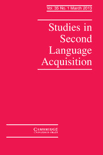
STUDIES IN SECOND LANGUAGE ACQUISITION
Connecting theory and practice in language education.STUDIES IN SECOND LANGUAGE ACQUISITION, published by Cambridge University Press, is a premier journal dedicated to advancing the field of second language acquisition. With an ISSN of 0272-2631 and an E-ISSN of 1470-1545, this journal has carved its niche as a leading resource for scholars and practitioners alike since 1978. Recognized in Q1 quartiles across both Education and Linguistics and Language, and ranked within the top 2% in its fields according to Scopus, it provides a platform for cutting-edge research that addresses the complexities of language learning and teaching. Although it does not currently offer open access, the journal remains widely accessible through institutional subscriptions, ensuring that groundbreaking research reaches a global audience. With a focus on empirical studies, theoretical discussions, and innovative methodologies, STUDIES IN SECOND LANGUAGE ACQUISITION is essential for those seeking to deepen their understanding of language education, making it a must-read for researchers, educators, and students committed to the evolving landscape of language acquisition.